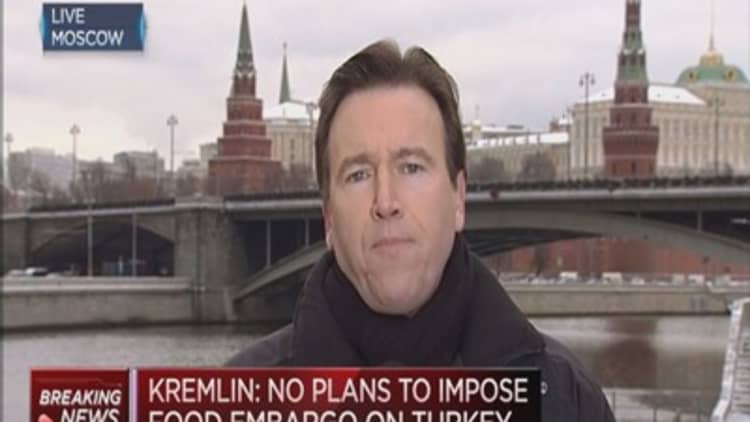
Russia is tightening controls on Turkish food imports just days after one of its jets was downed near the Syrian border, but some analysts say it may cause more harm to Moscow than Ankara.
Russia's agriculture minister, Alexander Tkachev, announced Thursday that approximately 15 percent of Turkish food imports were not up to Russian food safety standards, citing high levels of pesticides and other harmful substances.
That proportion could skyrocket, as Russian Prime Minister Dmitry Medvedev ordered the government to draw up measures that could see further food import restrictions along with the suspension of several joint investment projects, Reuters reported.
However, analysts warn that such measures could harm Russia's fragile economy and its consumers further, Otilia Dhand, Senior Vice President at Teneo Intelligence explained to CNBC via email.
"One aspect to bear in mind is that food import bans – alongside the deteriorating exchange rate of Russia's currency – have pushed substantial food price inflation in Russia over the past year." she said.
Earlier this year, Russia banned a number of European goods, burning piles of cheese and meats in a country where poverty levels were soaring. The ban came after Europe imposed economic sanctions on Russia for its annexation of Crimea and continued military influence in eastern Ukraine.
"Almost half of all food products consumed in Russia are imported. Banning Turkish food products would at the same time close an avenue for alternative supplies and potentially add to price increases," she said.
Inflation in Russia currently stands at 15.6 percent.
Playing chicken with Turkey
According to Russia's agricultural ministry, Turkish vegetables account for 20 percent of Russia's total supply, with imported agricultural products and foodstuffs worth over $1 billion.
Tkachev insisted that, if necessary, Russia would replace Turkish produce with imports from countries like Iran, Morocco, China, and South Africa. Perhaps anticipating retaliation, the minister added that a portion of Turkey-bound exports — already worth over $1.3 billion year to date — could be redirected to other countries in the Middle East and Africa.
However, Anthony Skinner, director of risk analysis firm Verisk Maplecroft, says Turkey is unlikely to play the same card.
"Ankara would clearly prefer to avoid an escalation, whether diplomatic or commercial," he said, highlighting comments from Turkey's EU minister earlier Thursday which outlined that the two countries "don't have the luxury" of unfriendly relations.
Still, a Russian import ban alone could take its toll, Skinner explained. Turkey's forecasted gross domestic product growth rate is already 2 percent lower than the government's 5 percent target, and could even be worse than anticipated if there is a December interest rate hike by the U.S. Federal Reserve which sends capital and investment flying out of emerging markets.
In the end, however, it could come down to national pride.
"Both Putin and Erdogan have to varying degrees of success projected their countries as strong, no-nonsense countries which will not be undermined or swayed by the actions of others," Skinner said.
"Their desire not to lose face has the potential to weaken otherwise pragmatic calculations to contain the crisis."



